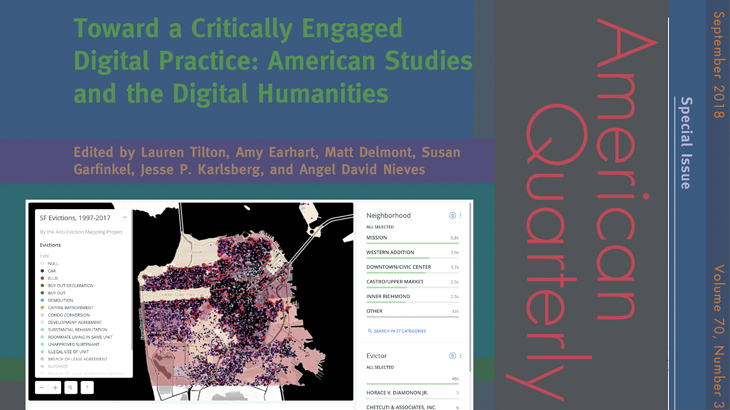A new special issue of American Quarterly coedited by the Emory Center for Digital Scholarship’s Jesse P. Karlsberg examines the intersections between American studies and the digital humanities. The issue is the first in the field-leading journal’s history to feature a section of peer reviewed digital projects in addition to traditional articles and forums. The issue is available open access for three months through ProjectMUSE.
The coeditors of the issue, “Toward a Critically Engaged Digital Practice: American Studies and the Digital Humanities,” sought to demonstrate the value of bringing together fields and methodologies associated with American studies and the digital humanities. As they write in the issue’s introduction, “American Quarterly in the Digital Sphere,”
foundational concerns for American studies—critical studies of gender, sexuality, race, class, nation, and disability, as well as interdisciplinarity and praxis—are underrepresented in many digital humanities journals and conferences (364).
Centering digital humanities tools, theories, and methods in American studies scholarship offers opportunities to “expand beyond text as the main form of analysis and argumentation” in this crucial work, the coeditors write (365).
A section of peer reviewed digital projects is a key manner in which the special issue leverages the digital humanities’ foregrounding of new forms of scholarly publishing. Each digital project is hosted independently and indexed by the Internet Archive’s Wayback Machine. The projects are also represented in the special issue by short texts written by their creators. The coeditors intentionally included such projects to highlight:
- The scholarly rigor of digital projects,
- The value of scholarship in various stages of development,
- The collaborative nature of digital scholarship, and
- The implications for sustainability of various digital publishing platforms.
To learn more about the special issue, read the coeditors’ introduction. You can also access the digital projects included in the issue and those discussed in depth in its articles and forums on the issue’s companion website.
